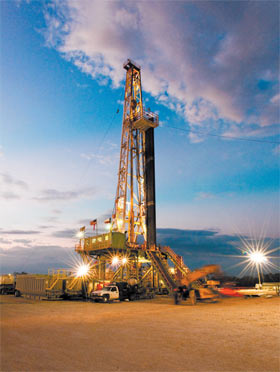Rise in US oil supplies haunts Opec talks
 For four decades, Opec meetings have been a subject of intense interest in the US because of the impact of the oil cartel’s decisions on the price of fuel. Today, there is equally close scrutiny going back the other way.
For four decades, Opec meetings have been a subject of intense interest in the US because of the impact of the oil cartel’s decisions on the price of fuel. Today, there is equally close scrutiny going back the other way.At a seminar in the Opec headquarters in Vienna on Wednesday, the rise in US oil supplies was the shadow that fell over every discussion. Over the past three years, the US has accounted for the entire net increase in global oil output, excluding Opec members and former Soviet republics.
Advances in the techniques of horizontal drilling and hydraulic fracturing, first applied to shale gas reserves, are now making it possible to develop US oil in reserves previously commercially unviable.
The US increased output of crude oil and other liquid hydrocarbons by 1.1m barrels a day during 2008-11. In that time, other countries that are not Opec members or former Soviet republics lost a net 200,000 barrels per day, according to the BP statistical review, a standard industry reference, published on Wednesday.
The rise of US shale oil, along with other sources such as Canada’s tar sands, is raising the prospect that Opec’s share of the global market for crude, and hence its influence over the price, could be undermined.
Opec’s defenders point out that the last rites have been read over the cartel many times and it is still in robust health.
Its continued strength has been on display over the past year, as members Saudi Arabia, the United Arab Emirates and Kuwait raised output to offset the loss of supplies caused by the civil war in Libya and sanctions against Iran. Had they not done so, the price of oil would have soared.
The challenge from North American supplies is still in its infancy. US production is a long way below its 1971 peak, and it remains the world’s largest oil importer.
The effect of increased flows of North American oil is likely to be offset by continuing decline for other western producers such as the UK and Norway.
Nevertheless, the prospect of increased American supplies coming on to the market as China’s slowdown deepens is a troubling possibility for Opec.
In Vienna, Ryan Lance, chief executive of ConocoPhillips, the third-largest US oil group by production, set out a vision of a global shale oil revolution to chill Opec members’ blood. The US was enjoying its first meaningful growth in oil production for 20 years, he said, and Conoco expected US shale liquids production to grow 150 per cent by 2020.
“Thanks to both shale and the Canadian oil sands, North America could become self-sufficient in oil … by 2025, and even a net exporter,” he said.
In a gesture to Ali Naimi, Saudi Arabia’s oil minister who was chairing the session, Mr Lance added that no one expected a level of US exports anywhere near the kingdom’s 8m barrels a day.
There was also potential to produce shale worldwide. Conoco and other companies are pursuing shale opportunities in countries such as Canada, Australia and Poland. “For too long, we’ve faced inaccurate perceptions in consuming nations of resource scarcity. [Now] both governments and consumers are becoming more aware of the greater abundance of oil and natural gas.”
Outwardly, Opec ministers and officials are sceptical that the cartel’s market share will be eroded.
Rafael Ramírez, Venezuela’s oil minister, said oil-consuming countries were labouring under a delusion that shale oil would “come to their rescue”, allowing them to throw off their dependency on Opec.
Production from oil shales declines faster than from conventional fields and has a much greater environmental impact, he said, and “thousands of wells” would have to be drilled to equal Opec exports.
Abdalla El-Badri, Opec’s secretary-general, acknowledged that shale oil and gas were changing the North American energy landscape. But there were still questions surrounding hydraulic fracturing, particularly its impact on groundwater, and it would “take time” to solve problems associated with the technique.
He added that Opec would welcome any country becoming self-sufficient in energy.
Privately, though, Opec member states are worried. Paul Stevens, senior research fellow at Chatham House, said expectations had always been that the rise in oil demand over the next 15-20 years would be met by Opec. But shale oil was changing the equation.
“With the technology moving beyond the US, you could foresee a situation where the increase in supply might not be coming from Opec,” he said. “That is bound to concern them.”
Since the 1970s, rivals to Opec production have emerged and faded. They have slackened the cartel’s grip, but never broken it.
Amrita Sen of Barclays Capital expects that on a five or 10-year view, Opec will remain the only force in the oil market with the swing capacity and discipline to change production and hence affect prices.
If non-Opec oil supplies look like becoming a serious threat, Saudi Arabia could lead a production increase to drive the price down, making high-cost rival sources uneconomic.
But Mr Stevens points out that the high oil price sought by Opec is a double-edged sword. On the one hand, they need it to balance their budgets. On the other, it encourages investments in unconventional oil reserves. “So they’re cutting their own throats,” he said.
You can return to the main Market News page, or press the Back button on your browser.

